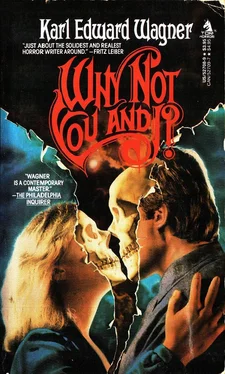As he passed a snack vending machine, he could hear a mouse feasting within.
“Dr Marlowe never sleeps.”
“Can’t spare the time, Mr Habberly. Surely you’ve heard that there’s no rest for the wicked.”
Habberly chuckled. “Never going to sleep long’s you keep drinking my coffee.” He handed Marlowe his cup — a gift from the Sandoz rep, featuring a smiling yellow Happyface and the wish to “Have a Happy Day” from “Mellaril.” Pudgy and greying, Habberly was nearing state retirement age; he had been an orderly and later ward supervisor at Graceland since it opened. He and an aging male nurse, occasionally joined by a ward attendant on break, were the only inhabitants of North Unit’s administrative section during the graveyard shift.
“Careful, Doctor — that’s fresh poured!”
Marlowe ignored his warning and swallowed without looking up from his admissions notes. “Thank you, Mr Habberly.”
“Never could understand how some folks can drink coffee when it’s hot enough to scald your hand carrying it.”
“Practice deadens all feeling, Mr Habberly, and because there’s too little time to wait for it to cool. But I can still taste: you brew the best cup of coffee in Graceland.”
“Thank you, sir. Well, now, that’s practice again. I don’t fool with that big urn the day shifts use. Got me a three-four cup percolator just right for night shift. Been using it for years. And I don’t fool with state-purchase coffee.”
Marlowe finished his coffee and handed Habberly a sheaf of triplicate forms. “Here’s the commitment papers for tonight’s involuntaries. With luck you won’t have any more admissions until day shift comes on in an hour.”
Habberly thumbed through the forms, making certain that all had been signed and notarized as the law required. A patient could only be committed involuntarily if he constituted an immediate threat to others or to himself in the opinion of local magistrates and the admitting physician. Marlowe had had three involuntaries on North Unit tonight.
Habberly paused over the commitment papers for Frank Carnell. “Is this the patient who was causing the fuss about someone stealing his suitcase?”
Marlowe craned his neck to see which patient Habberly meant. “Yes. Which reminds me that I told Macafee I’d look in on him. By the way, you didn’t happen to notice whether Carnell had any sort of bag or anything with him when he was admitted, did you?”
“Why, no sir. He didn’t have any personal belongings with him at all. The deputies carried him up here straight from the emergency room at Franklin Memorial. I let them into the ward when they brought him here ’long about midnight.”
The admitting ward for each unit was a locked ward, and it was hospital policy that every patient admitted after hours or on weekends must be kept on the admissions ward until such time as the psychiatrist to whose service he was assigned had had an opportunity to interview him. The rule applied to voluntary and involuntary patients alike. Patient advocates complained that this rule was only intended to discourage voluntary admissions after office hours, but hospital administration pointed out that the rule had come into being after a Korean resident blithely admitted a seemingly depressed voluntary patient to an open ward one night, who quietly strangled and raped the retarded teenage boy who shared his room and passed it off the next morning as the work of Mafia hitmen.
Marlowe let himself into North Unit Admission Ward. It was, he reflected, a bit of a misuse of terms in that patients judged not suitable for the open wards might linger in a unit’s admission ward for weeks until proper disposition could be made. Graceland did not treat dangerous psychotics in theory; the state maintained a hospital for the criminal insane, now euphemized as a forensic psychiatric facility, in conjunction with the state penitentiary at Russellville. A patient who required long-term hospitalization at Graceland was either found suitable for an open ward or transferred to a chronic care ward, where long-term hospitalization usually meant lifetime.
Macafee nodded to him through the glass of the nurses’ station, unlocked the door to let him enter. “Good morning, sir. Almost 600 hours; we’ll be waking them soon. Care for some coffee, sir?”
“Yes, thank you.” Marlowe looked through the glass. The nurses’ station was a locked cubicle placed along one wall to give an aquarium resident’s view of the communal ward. Already several of the patients were beginning to shuffle about between the closespaced beds; it was close enough to breakfast, which arrived with the day shift, that minimal activity was permitted.
“Any problems?” Marlowe signed his telephone orders in the ward orders book.
“No sir. Not after we put Mr Carnell to bed.” Macafee sometimes confused the ward with training barracks, but it was usually quiet when he was on night shift, and Marlowe disliked disturbances.
“How is Mr Carnell?”
“Quiet, sir. Sawyer’s checking on him just now.”
“I’ll just take a look myself.”
A short hallway led from the communal ward to the outside corridors. Connected by a door to the nursing station was a small room for supplies and medications. There was an examining and treatment room farther along the hallway, then toilets, showers, a patients’ lounge, and several seclusion rooms. Carnell was lying-on the bed within one of these; a wooden night stand was the only other furnishing. Sawyer was just coming out of the room.
“Good evening, Dr Marlowe — or good morning, it’s getting to be.”
“And let’s hope it will be a good day, Mr Sawyer. How is Mr Carnell?”
“He’s been resting quietly. Starting to wake up now.” Sawyer had had ambitions of a pro-football career before a high school knee injury scrubbed that as well as hopes for a college scholarship. He was ten years younger than Macafee and a good audience.
Carnell was muttering to himself when Marlowe bent over him. “Good morning, Mr Carnell,” Marlowe said, since his eyes were open. “How do you feel?”
“Damn you, Marlowe!” Carnell sat up sluggishly. “I’ve been locked up, robbed, drugged, I don’t know what! Do you think you’re running some sort of prison camp? I demand to be released from this zoo right now!”
“I’m sorry, Mr Carnell. Have you forgotten why you came here?” Marlowe’s voice was patient. “Try to remember.”
Carnell’s face showed anger, then growing indecision. His eyes began to widen in fear.
“Mr Sawyer, could we have that IM Valium order stat?”
“Yes sir. Five mgm, was it, Dr Marlowe?”
“Better make it ten.”
The chronic care wards were always on the second story of Graceland’s far-flung units. Marlowe supposed this was because Graceland had no cellars. Presumably, had there been cellars, the temptation to wall them off would have been irresistible. Marlowe supposed Graceland had never had cellars.
There were two basic divisions among the chronics: the ambulatory and the nonambulatory. The ambulatory could be trusted to leave their locked wards, perform acceptably under controlled situations, and return to their locked wards. The nonambulatory could not be trusted to function within acceptable guidelines. They remained in their wards, often in their beds, often only a dream from the chronic med care unit; spoon-fed gobs of pasty slop, when they could no longer handle spoons; moved to the chronic med unit when they could only be fed through tubes and IV’s.
They fed the ambulatory chronics three times a day — breakfast, lunch, and dinner — the same as living souls. This meant they were herded from their wards three times a day, down the stairs (there was an elevator for each unit, and those who could walk, but not negotiate stairs, were granted this), and along the tiled corridors to the patients’ cafeteria. They moved along docilely enough, each regimented segment of quasi-humanity, herded along the long, long corridors by nurses and attendants.
Читать дальше












